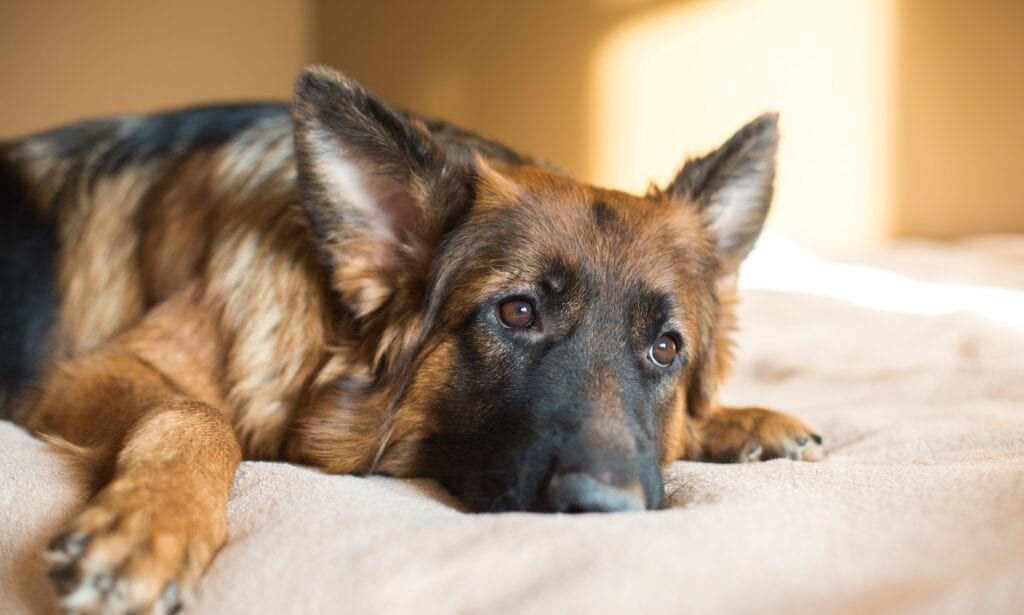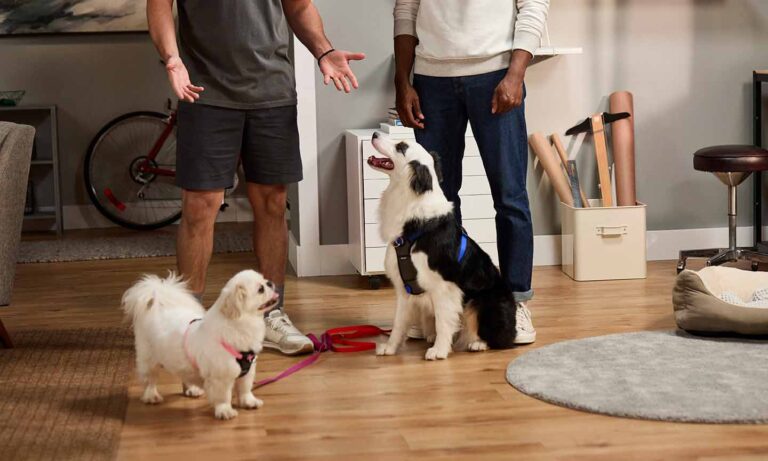Dogs, like many other animals, can experience a wide range of emotions.
From happiness to sadness, our furry friends have feelings, too. They can express themselves in several ways.
For example, tail wags, perky ears, and playful body language usually mean your pooch is happy. If they’re sad, you might notice your pup’s downtrodden gaze, or they may have less energy or interest in activities they usually enjoy.
Emotions such as happiness and sadness may be somewhat obvious to an in-tune pet parent, especially for pups who tend to be more expressive.
But what about grief? Do our furry friends deal with this complex emotion?
As humans, we certainly mourn the loss of our loved ones. It turns out that dogs may experience similar feelings of grief when they lose a companion.
In This Guide:
Do Dogs Have Emotions?
Dogs can feel a variety of emotions, including happiness, fear, anger, and even love. These emotions are often displayed through body language, behavior, and how they interact with others.
For example, a wagging tail often means your pup is happy, while cowering may show fear.
Behavioral studies and observations have shown that dogs experience emotions. A 2015 study published in Current Biology showed that dogs have the ability to distinguish between different human facial expressions. More than just reading cues, their reactions to happy and angry faces suggest that dogs—much like humans and other animals such as elephants and dolphins—exhibit emotional intelligence.
Research published in a 2016 Science article also supports the idea that dogs have emotional responses similar to humans, with areas of their brains lighting up in ways that correspond to specific feelings.
Research like this supports the broader understanding that dogs have emotions and can recognize and respond to the emotions of humans and other dogs.
What Is Dog Grief?
Dog grief refers to the emotional pain and sadness a dog may feel after losing a close companion, whether it’s a pet sibling or a beloved human.
“Although we can't know exactly what is going on in a dog's mind, we do believe that dogs (and cats) experience grief,” says Emily Gamm, DVM, an associate veterinarian at South Sioux Animal Hospital in South Sioux City, Nebraska.
“Like people, every dog expresses grief in a different way,” says Dr. Gamm. “Some dogs will temporarily stop eating, some will be depressed and less interested in their usual activities, and others will be more clingy than usual.”
If you’ve noticed your canine companion is withdrawn or experiencing a change in appetite or sleep pattern after the loss of another pet or human friend, they may be going through their own version of mourning.
While many dogs show some form of mourning after a loss, it’s not always the same signs or to the same extent. Like people, Dr. Gamm says pets grieve for varying lengths of time, and the ways individual dogs express grief can be different. Pets who’ve lost an animal companion may sometimes want to lie in their friend's spot, she says. Dogs who’ve lost their human companion may even wander around the home looking for that person, adds Dr. Gamm.
It can be heartbreaking to see your furry friend experience tough emotions like grief. But there are some ways to help support them through a difficult loss.
What Are the Signs of Dog Grief?
Dana Fedman, a certified dog behavior consultant and founder of Pupstart Family Dog Training in Des Moines, Iowa, says that grieving dogs may show several behavior changes, as well as physical and emotional symptoms.
In fact, the ways our dogs grieve can closely mirror the ways humans experience grief.
“Dogs have the same brain structure as humans, including a rich emotional life,” Fedman says. “Just because they don’t have the ability to communicate verbally doesn’t mean they aren’t experiencing intense emotions.”
Behavioral symptoms of grief in dogs may include:
- Withdrawal from social interactions
- Lack of interest in play or walks
- Clinginess; seeking comfort
Physical symptoms of grief in dogs may include:
- Decreased appetite
- Sleeping more than usual
- Lethargy
Emotional symptoms of grief in dogs may include:
- Whining or crying
- Restlessness
- Signs of anxiety or stress
It’s not uncommon for dogs to show any of these signs after a loss, and it may take anywhere from a few weeks to a few months for them to get back to themselves.
During this time, it's important to support them with lots of love and affection.
Rochelle Hartson, DVM, a veterinarian at IGH Animal Hospital in Inver Grove Heights, Minnesota, says that while withdrawal and lack of interest may be indicators that your dog is grieving, you should talk to your vet if your dog refuses to eat or drink, as they may need veterinary care.
“If their grief is such that it’s affecting their health (i.e. not eating, losing weight), or if it seems like their grief is impacting their quality of life for more than a few months, you should seek veterinary help,” Dr. Hartson says.
A visit to the vet can help you rule out any underlying health issues that may be causing these changes. Your vet can also provide recommendations tailored to your pet’s circumstances.
How To Help a Grieving Dog
Vets and behaviorists agree that providing support and comfort to your dog is the best way to help them recover from the loss of another pet or human companion. Like people, dogs need time to get back to feeling themselves. Dogs who have lost a companion they’ve had for years may experience more intense grief, though dogs of any age or breed can experience grief.
While the intensity, signs, and length of time that dogs grieve may vary, “the best thing you can do is give them some extra love and attention and be patient as they navigate their loss,” says Dr. Gamm.
1. Give Your Dog Time and Space to Grieve
Grieving is a process that takes time. Allow your dog the space to mourn—don’t try to rush them into activities they may not be interested in right now. Like humans, dogs need time to adjust to the loss and process their emotions.
Fedman says to be mindful of your pet’s body language when trying to determine how much space to give your grieving dog. They may signal that they want physical comfort by following you around or being closer or more “clingy” than usual. Or they may do the opposite by getting up or moving away from you to signal that they need space. “When your dog needs comfort, comfort them! If your dog doesn’t want it, give them some room.”
2. Provide Your Dog With Comforting Scents
Familiar scents can bring comfort to a grieving dog.
Consider keeping a blanket or toy that carries the scent of their lost companion. This may help ease their sense of loss and provide some reassurance. A calming pheromone spray or diffuser may also comfort your pup as they navigate their new normal without their buddy.
3. Stick to Your Routine
Fedman says the first thing she tells pet parents with a grieving dog is to keep a consistent schedule. Stick to regular feeding times, daily walk schedules, and usual bedtime routines. Consistency can provide a sense of security and create familiarity amidst loss.
4. Keep Your Dog Mentally and Physically Active
Balance the time and space needed to grieve with regular opportunities for engagement. Socialization and activity can promote a healthier recovery after a loss. Enrichment activities like puzzle toys, treat dispensers, or other interactive games can keep them busy (if they’re interested in and energetic enough to play, that is).
If your dog is interested in food, Fedman recommends stuffing a classic KONG® or Toppl® food-dispensing toy with dog-safe snacks such as peanut butter, canned pumpkin, and kibble. Frozen lick mats are another favorite she recommends to clients. However, she cautions against using these toys if your dog is not eating.
Fedman also says hunting and seeking activities designed to tap into dogs’ natural instinctive behavior can offer a welcome change of pace. Try hiding high-value treats around the house for a scavenger hunt that works your dog’s brain and their body. Create a no-cost DIY snuffle activity with a towel and some treats. “Roll the towel up sideways and scatter their food in the folds for a great distraction for their nose,” she says.
Toy lovers may perk up with the addition of a new stuffy or chew bone to their toy rotation. If your dog is usually social, a playdate with another dog friend may be a welcome distraction—just remember not to force it if they’re not ready for fun quite yet.
5. Spend Time With Your Dog
Extra attention and bonding time can be soothing for a grieving dog (and you as well). Be sure to spend a lot of quality time together, whether it’s cuddling on the couch, taking longer walks, or playing their favorite games.
A few other things you can do to cheer up your pup include:
- Play fetch
- Take a hike together
- Take a day trip
- Go to a pet-friendly store and allow your dog to pick out a new toy
FAQs About Dog Grief
Q:How long does dog grief last?
A:Dog grief can last anywhere from a few weeks to several months. The length of time depends on the individual dog and the depth of their bond with the lost companion.
Q:How long do dogs grieve the loss of their pet parent?
A:Dogs may grieve the loss of a pet parent for several months, showing signs of sadness or withdrawal as they adjust to the change in their life.
Q:How do you help a dog cope with the loss of another dog?
A:Help your dog cope with the loss of their pet sibling by providing extra attention, sticking to routines, and introducing new activities to keep them mentally and physically engaged.
Grieving is a natural reaction to the loss of someone we love, and dogs need our support when they lose a companion. Knowing how to comfort a pet who’s in mourning can help your dog heal. Remember, your love and patience are the best gifts you can offer your grieving dog.
Looking for ways to honor a beloved pet who’s crossed the rainbow bridge? These pet memorial ideas are a great place to start.
Expert input provided by Emily Gamm, DVM, associate veterinarian at South Sioux Animal Hospital in South Sioux City, Nebraska; Dana Fedman, CPDT-KA, CDBC, founder of Pupstart Family Dog Training in Des Moines, Iowa; and Rochelle Hartson, DVM, a veterinarian at IGH Animal Hospital in Inver Grove Heights, Minnesota.
Check out similar reads:
Share:















